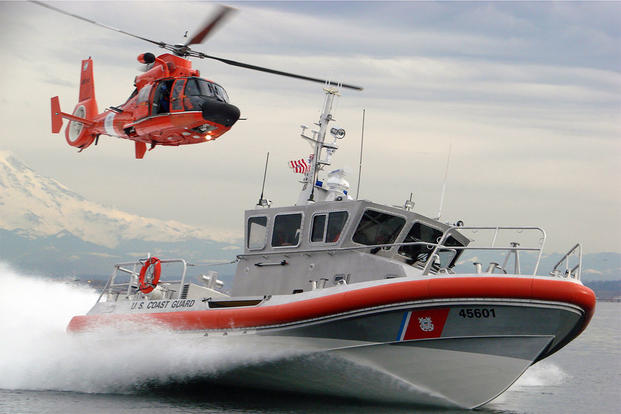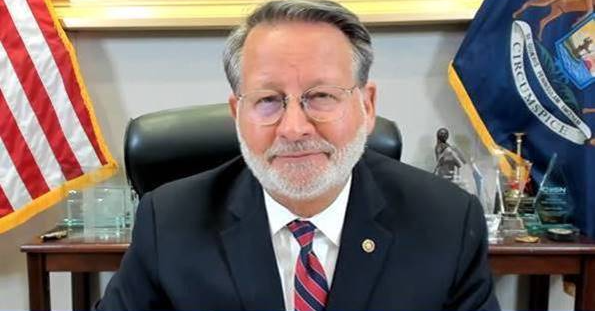 WASHINGTON, DC – U.S. Senator Gary Peters (MI) highlighted concerns over the potential closure of United States Coast Guard (USCG) units in Michigan during a confirmation hearing for Admiral Kevin E. Lunday, nominee to be Commandant of the USCG. During the hearing in the Commerce, Science, and Transportation Committee, Peters raised concerns about changes to search and rescue units across the country, which are critical to the safety of Michigan’s Great Lakes communities. Peters went on to applaud successful efforts by the USCG to surpass its recruiting goals and asked specifically if an increase in personnel will enable the USCG to fully staff Michigan’s USCG units.
WASHINGTON, DC – U.S. Senator Gary Peters (MI) highlighted concerns over the potential closure of United States Coast Guard (USCG) units in Michigan during a confirmation hearing for Admiral Kevin E. Lunday, nominee to be Commandant of the USCG. During the hearing in the Commerce, Science, and Transportation Committee, Peters raised concerns about changes to search and rescue units across the country, which are critical to the safety of Michigan’s Great Lakes communities. Peters went on to applaud successful efforts by the USCG to surpass its recruiting goals and asked specifically if an increase in personnel will enable the USCG to fully staff Michigan’s USCG units.
“Particularly, given the fact that, as we talked about in my office, you have experienced record recruitment, which is a certainly a hats off to the men and women in the Coast Guard, that folks want to be a part of a great service,” said Senator Peters during the hearing. “But with those extra folks coming in, will that potentially lead to additional support for your facilities in the state of Michigan?”
In response, Admiral Lunday said: “We are directed now in Force Design to assess our operating concept in our entire force structure everywhere the Coast Guard is located. We haven’t gotten far into that analysis yet, we owe that recommendation and report to the Secretary, and we’re just getting that work. But, an important part of that will be making sure we understand the concerns of those in the communities and the Senate here and the rest of Congress are in terms of our facilities throughout the United States, especially in Michigan.”
To watch the full video of Senator Peters’ questioning, click here.
Peters also emphasized the importance of the USCG Great Lakes Center of Expertise, which he created in 2018 to study the impacts of oil spills in freshwater environments and help develop effective responses to protect the Great Lakes from a potential spill.
“We still need to learn a lot more about how we deal with oil in freshwater, there’s lots of knowledge regarding that for saltwater, but freshwater presents a unique set of challenges. When you think about the Great Lakes providing drinking water to over 40 million people, it’s particularly important,” said Senator Peters.
Admiral Lunday, who visited the Center of Expertise in January 2023, shared his takeaways on the significance of the center’s mission.
“I learned the important work that they do there to understand the critical nature of the Great Lakes system, not only from a national security perspective and its northern border, but also what a potential oil spill or other environmental damage, such as invasive species, could create in the Great Lakes,” Admiral Lunday said in response. “So, the importance of that work, informs our understanding of risk and then the ability to prevent activities that could cause that damage, and then be ready to successfully respond to it, such as an oil spill.”
Peters led the effort to establish the Great Lakes Center of Expertise after the then-Commandant of the U.S. Coast Guard told Peters at a committee hearing in 2017 that the agency was not prepared for an oil spill in the Great Lakes, saying that more science and research was needed. After establishing the Great Lakes Center of Expertise, Peters successfully secured $4.5 million in total to kick-start the initiative. Peters then announced that the Great Lakes Center of Expertise would be dual headquartered in Michigan at Lake Superior State University (LSSU) in Sault Ste. Marie and the Great Lakes Environmental Research Laboratory in Ann Arbor to maximize its research and operational capabilities. Peters led the official ribbon-cutting ceremony for the Center for Freshwater Research and Education at LSSU, which is home to the Center of Expertise, in 2022. As a member of the Senate Appropriations Committee, Peters has continued to advocate for additional funding to support the Great Lakes Center of Expertise’s work.
Peters has also led efforts to bolster USCG recruitment and retention. Earlier this year, he called on the Trump Administration to prioritize funding for U.S. Coast Guard recruitment and retention. In a letter to Admiral Lunday, Office of Management and Budget (OMB) Director Russell Vought, and U.S. Homeland Security Secretary Kristi Noem, Peters outlined how critical Coast Guard operations have been disrupted as a result of personnel shortages and underscored that further investment is needed to support ongoing recruitment and retention efforts for the Great Lakes region to address these shortages.








